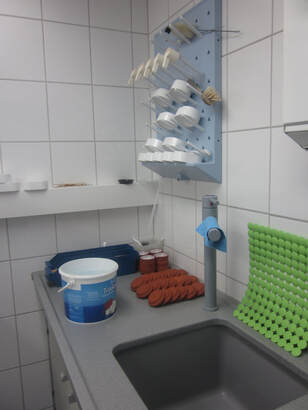|
A lab I worked at in 2013. Why did I photograph a sink? Who knows. Nearly every science fiction story includes a scene in a lab. Sometimes a murder mystery, medical drama, or other genres include a scene like this too. A scientist in a white coat explains to the protagonist and side characters information necessary for the plot to advance. It’s more interesting than getting an info dump in narration, so it’s a nice device. But this trope is often riddled with errors.
I’ve worked in several labs, most at universities, but also beyond a campus boundary. Here are my top tips for writing an accurate lab. 1. Where’s the safety equipment? Anyone working in the lab (either active in the scene or mentioned in the background) is going to be wearing some basic personal protective equipment (PPE.) That white coat I mentioned? It’s not for show. It’s for chemical spills. Adding one more clothing layer can buy time to run to the emergency shower in the corner. Clothes will be ruined, but at least that caustic acid won’t get to tender human skin. Other safety items: safety glasses (yes, on TOP of prescription glasses. No, it’s not comfortable), gloves (usually not latex, unless it’s a surgical suite. Nitrile is more common in labs now. They’re still stretchy, but they don’t smell), closed toed shoes (high heels do NOT count), and pants. Don’t forget the safety shower (always over a drain, usually has a bright yellow sign or handle to grab attention), and eye wash station (usually attached to the sink.) If your characters must be in the lab, these are all solid items to mention to ground the scene. 2. Meetings, especially with non-scientists, are almost never in the lab. Labs are a mess. They’re highly sensitive, full of breakable equipment, and house toxic chemicals. No one wants a crowd of laypeople wandering their lab while they’re doing an experiment. That’s a one-way ticket to ruined data. Meetings should be set in conference rooms or at most the lead scientist’s office. There will still be plenty of visuals, maybe even a demonstration. But as cool as labs are, in reality there won’t be a tour. This might help save you the trouble of describing a unique lab setting, which can be a challenge if you’ve never spent time in any labs. Besides, calling everything “equipment” or “machines” won’t benefit your reader much as those terms lack specificity. Placing the characters in a familiar type of setting (office, conference room) can help offset the unfamiliarity of the information the scientists will present. 3. The lead scientist is usually not working in the lab. Assuming this is a big enough lab, the lead scientist, also known as primary investigator (PI) at universities, is usually busy. As a professor, they might be teaching, travelling for conferences, writing grant proposals, etc. The lab will be filled with lots of other scientists, including lab technicians, post-doctorals, PhD students, undergrad interns, the lab manager, etc. And keep in mind, not everyone in the lab has a PhD, so your characters shouldn’t address everyone as Dr. So and So. 4. Labs need money to run. Not only do they need to pay the employees, but labs need to constantly buy more machines, chemical supplies, office supplies, glassware, cleaning supplies, and—if animals are involved—lots of food. Labs are always seeking money, usually through grants from foundations, but also fundraising, or a parent company if it’s outside the university setting. This is going to be a major factor on the mind of whatever character is explaining the science to your protagonist. Consider where the lab is getting money, and if that would affect any characters or plot points. 5. The ratio of success to failure is not what you think. For every successful experiment, a lab probably has dozens of failures. And I don’t mean nothing happened, I mean the data is so random the results are meaningless. Statistics play a giant role in interpreting final results, and the scientists will have set up boundaries before starting that define “hypothesis is supported” and “hypothesis is not supported.” Most of the time, the data shows the latter, but not in a defined pattern that means anything else. It’s very frustrating, and if you look up scientist memes, you’ll see a lot of joking about failure. In terms of your writing, this means when your protagonist is shown a super cool new machine, it’s not version 2.1. It’s more like version 89.8, and it likely took years to perfect. (Unless aliens are involved, but even alien scientists have failures.) 6. Scientists will never say they proved anything. This gets misinterpreted all the time. No matter how outstanding the results of an experiment, their original hypothesis is never proven. Scientists will say their hypothesis was supported, which may support a larger theory. However, if asked, a scientist will not say their hypothesis was proven. I think of this as leaving the door open. A scientist should always be willing to look at new data and interpret it independently, even when new data may contradict an old hypothesis that earlier data supported. Theories are supported by many supported hypotheses, and laws (like the law of gravity) have so far been shown as never contradicted. When your scientists speak, make sure they never say they’ve proven anything. Discovered, supported a new or alternate hypothesis, challenged previously held theories, defied laws, all of those are better phrases for science fiction than the word prove. Did this list help you with your laboratory scene? Are you a scientist and have any more tips and tricks for fellow writers? Let’s discuss in the comments!
0 Comments
Leave a Reply. |
Archives
April 2024
Categories
All
|


 RSS Feed
RSS Feed